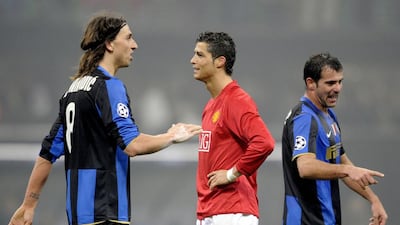Last weekend, shortly after scoring a hat-trick for Paris Saint-Germain, Zlatan Ibrahimovic returned to Sweden for the annual engagement he has learnt to ink in his diary as a matter of routine. It was the Swedish Footballer of the Year award. The prize has a list of nominees but for seven of the past eight years only one possible winner, Ibrahimovic.
In a country which, as Ibrahimovic describes it, “is a smaller football nation than Portugal”, whom Sweden meet tonight in Lisbon in the first leg of their World Cup play-off, he towers over his professional compatriots. Indeed, he casts a shadow beyond his sport.
A set of Swedish postage stamps is shortly to appear bearing his image. And he is the only individual footballer to have won Sweden’s Jerringpris, a prestigious sports award voted on by the public and usually the territory of soloists, winter Olympians, tennis players or golfers.
The story of the night, six years ago, when he won the Jerringpris is a revealing one. At the ceremony, Ibrahimovic bumped into the former Sweden striker Martin Dahlin. Each asked the other what had brought them to the gala.
Dahlin reminded Ibrahimovic that, back in 1994, the Swedish national squad in which Dahlin played, had been the award’s one-off winners for having finished third at the World Cup in the US.
Ibrahimovic, ever the maverick, responded with what he calls “a little cockfight”.
“Oh,” he said to Dahlin with a smile. “You won it as a team, yes? Well, I am nominated on my own, as an individual.”
Tonight’s contest is about football nations of very different character, one from southern Europe, the other from Scandinavia, but from almost any perspective, it is hard not to view it through the lens of two outstanding individuals.
Or, better put, two of the game’s most brilliant individualists.
Ibrahimovic and Portugal’s Cristiano Ronaldo dominated the build-up. They are undoubtedly each team’s major strength. As Kim Kallstrom, the Swedish midfielder, put it: “Obviously Ronaldo’s going to give us problems. We’ve got to mark him tight, right on top of him, and stop him getting the ball in space where he can turn and set off.”
From the red corner, Bruno Alves, the Portugal defender earmarked to monitor the movements of Sweden’s captain, echoed: “Denying Ibrahimovic space is the key, but we must also make sure he doesn’t get the service he needs.”
The danger, as both coaches have noted, is to become obsessed with one player. But that may also be the perilous condition that Portugal and Sweden have over the last decade gradually fallen into. The reality for both Ibrahimovic and Ronaldo is that in the period they have emerged as two of the world game’s greats, their national sides have declined, developing a dependence on their individualist inspirers.
Nine years ago, at Euro 2004, Sweden were quarter-finalists and only a penalty shoot-out short of making the last four. Portugal reached the final of that tournament.
In those days, Ronaldo and Ibrahimovic were emerging stars, dazzling certainly, but part of teams with other match-winners alongside them, like Henrik Larsson or Luis Figo.
Since then, Ronaldo and Ibrahimovic’s status in their national XIs has seemed to grow disproportionately large. In the Ibrahimovic era, Sweden have not gone as far in any tournament as they did at Euro 2004. They failed entirely to reach the 2010 World Cup.
Ronaldo’s Portugal have not reached a final since 2004, either.
After rickety qualifying campaigns for both Euro 2012 and the 2010 World Cup, they have become play-off perennials.
The Brazil 2014 journey has been full of stumbles: Ronaldo’s three goals rescued them two months ago from 2-1 down and with a man sent off, to beat Northern Ireland.
But he could not help them to more than a draw at home to the same limited opposition, though, nor to take more than two points from two meetings with Israel.
It is pessimistic form, and as Ibrahimovic suggests: “We deserve to go through more than Portugal do.” He notes Sweden finished second in a hard group, led by Germany, while Portugal were second in a softer group won by Russia.
---
Tiny Iceland can make big history against Croatia
Iceland’s football team are aiming to make history in their play-off against Croatia, as a win would make Iceland the smallest country to qualify for the World Cup.
If the team were to come through the play-offs, in Reykjavik on Friday night and Zagreb on Tuesday, Iceland would become the first country with a population of less than a million to reach the finals. Lars Lagerbeck, the Iceland coach, said Croatia are the favourites “on paper”.
He added: “But we are going upwards all the time now.”
sports@thenational.ae
Follow us on twitter at @SprtNationalUAE


